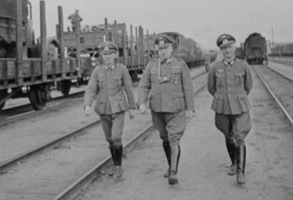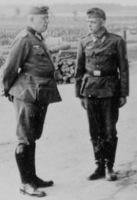Diary of a Commander of Prisoners of War
In the journal of a former concentration camp commander, evidence was found on the systematic killing from hunger, freezing, plagues, and abuse. Johannes Gutschmidt had meticulously kept to his daily routine in several camps. The fate of the Soviet prisoners of war during the second World War is an almost unknown tragedy. Out of roughly 5.5 million, 3 million died in German camps. There they systematically starved and froze to death. They died from abuse, exhaustion, or epidemics. Until now, there has been little evidence about the camps for prisoners of war in the Third Reich. An extraordinary finding in 2001 caused a sensation: a journal in which a commander described his daily routine. Between 1939 and 1944, Johannes Gutschmidt was commander of several transit camps for Russian prisoners of war in Poland, the Soviet Union, and White Russia – the center of mass murder of Soviet prisoners of war. The journal detailed the horrors of life in the camps – cold, hunger, cannibalism, suicide – and at the same time uncovered the biography of a man. It described an officer loyal to the emperor who did not sympathize with the Nazis, yet nevertheless became a criminal.The journal of Johannes Gutschmidt is the process record of a catastrophe. It raises the question again of the responsibility of individuals in the killing machine of the Nazis.


Diary of a Commander of Prisoners of War
documentary film, 52 Min., Radio Bremen / ARTE 2010
Producer, director and screenwriter: A. Krug-Metzinger
In cooperation with Aleksandra Syty
camera: Bernd Meiners, Edward Kłosiński †
sound: Jörg Johow
editing: Wiebke Abraham
music: André Feldhaus
television editor: Mechtild Lehning
HDCAM / Digi-Beta / 52 min. / 16:9 / German
Supported by: Hessian Film Fund